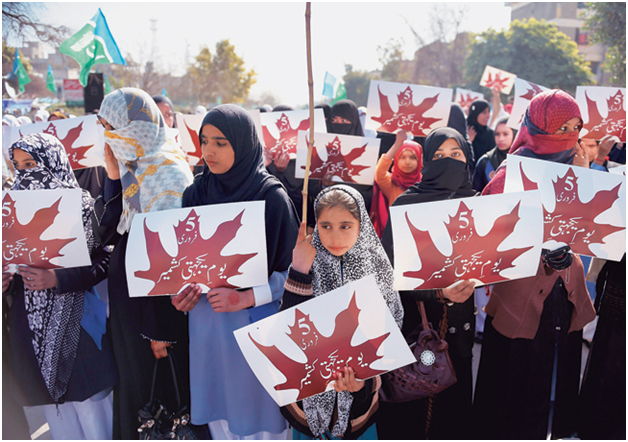India Hits Out at Pakistan for Hype on 'Kashmir Solidarity Day
'Kashmir Solidarity Day' in Pakistan; India takes Pakistani discrimination of its own people to the

NEW DELHI: India on Thursday reacted sharply to the activities and remarks that characterised Pakistan’s celebration of what it calls “Kashmir Solidarity Day.” India particularly hit out at rallies and speeches that were held by banned terrorist groups including the Jama'at-ud-Da'wah (JuD) and Pakistani Prime Minister Nawaz Sharif’s remark that Kashmir was the "jugular vein" of Pakistan.
Indian Ministry of External Affairs spokesperson Syed Akbaruddin said, “We are aware that there are multiplicity of activities that are being undertaken in Pakistan by their leaders and unsavoury elements who are wanted elsewhere. Pakistan's self destructive and futile quest for territorial aggrandisement in Jammu & Kashmir is well known.” "It is high time for Pakistan to start paying attention to all the problems that afflict them rather than covet what is not theirs and never will be," the spokesperson said, reiterating that Jammu and Kashmir is an integral part of India.
Earlier in the day, Pakistani Prime Minister Sharif had, whilst addressing a rally in Pakistan-occupied Muzaffarabad, said that that he had an emotional bond with Kashmir since his childhood, going on to describe the disputed territory as the “jugular vein” of Pakistan -- an analogy that the Pakistani PM has previously employed as well.
Pakistan had on numerous occasions said that a resolution to the Kashmir dispute is essential to peace in South Asia and maintains that “The only just solution of Kashmir is through giving the right of self-determination to its people.” “Time is not far away when the clouds of oppression will shed and the Kashmiri people will see the dawn of independence,” Sharif was quoted saying by Radio Pakistan. “There will be no compromise… This is an issue for the whole nation and with our determination and resolve, we will make progress.”
These comments come whilst rumours circulate on the resumption of back channel diplomacy, as Pakistan’s former National Security Adviser Major-General (Retd.) Mahmud Durrani met with NSA Ajit Doval and Foreign Secretary S. Jaishankar this week.
Although the MEA spokesperson dismissed a question in regard to whether this could pave the way for the resumption of an India-Pakistan dialogue, General Durrani was quoted by The Hindu saying that his impression is that Prime Minister Narendra Modi would “like to move forward” on the dialogue, but would rather not pick up the old format of the composite dialogue process. “Mr. Modi is a different man with a different mind and a different thinking from the previous Prime Minister,” The Hindu quoted General Durrani as saying. “I think he will probably engage with Pakistan, but he would like to do that in his own way.”
The backdrop of these developments, however, is a dip in relations between India and Pakistan, with constant ceasefire violations across the line of control. Both sides have been accusing the other of “indiscriminate firing,” with violations starting in late 2014 and continuing into 2015. The firing prompted Pakistan penning a letter to UN Secretary General Ban Ki Moon that invoked the UN to implement resolutions for a plebiscite in Kashmir.
The letter marked a major reversal of Pakistan’s position for over a decade, sending bilateral relations between the two countries plummeting.



